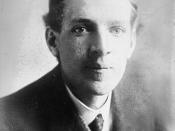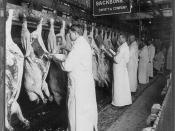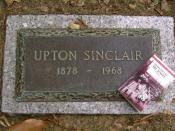The Jungle
By: Upton Sinclair
The Jungle, written by Upton Sinclair in 1906, enlightens the reader about Socialism as a remedy for the evils of capitalism; the immigrant experience and the hollowness of the American Dream. The third-person narrator focuses on what the main character, Jurgis Rudkus, and what he feels, learns, and experiences. Sinclair also shows the social values that affect his characters lives in the past and future, but the entire novel is in the past tense.
During the early 1900s, there was a little place called Packingtown within the city of Chicago. Ironically, this was the meat-packing sector of Chicago. In Packingtown, any mishap can bring ruin upon a family (foreshadowing eventual destruction). Jurgis Rudkus and Ona Lukoszaite, a young man and woman who have recently immigrated to Chicago from Lithuania, held their wedding feast at a bar in Packingtown, where they prepared to reside, with their son Antanas.
Winter is the most dangerous season in Packingtown, and in this filthy, dangerous place, it was difficult to find a job. Jurgis, who was forced to work in an unheated slaughterhouse, in which it is difficult to see, risks his life every day by simply going to work. Eventually, Jurgis injures himself and is forced to spend nearly three months in bed, unable to work.
Many dramatic occurrences take place in Jurgis and Ona's lives. It all begins when Ona doesn't return from work one night, Jurgis ascertains what occurs and his actions send him to jail, but this is not the last time he will visit this penitentiary. After the demise of his son Antanas, Jurgis felt destroyed by capitalism.
Jurgis eventually finds inspiration at a socialist political rally. He finds another job and is reunited with Ona's stepmother, Teta Elzbieta Lukoszaite; Teta is a resilient,



My thoughts
I felt that this essay was very, well, bland. It was a basic summary of the buook, but it did not delve into the despair that was suffered at the hands of Jurgis, the horrific conditions of the Chicago meatpacking industries, and didn't really go into how he suffered and his tribulations, which is really a focal point of the story. Dissapointing for a book report.
1 out of 1 people found this comment useful.